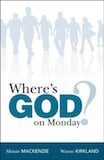Chapter 5: Futile Work: Struggle and Frustration
Book / Produced by Individual TOW Project member
The biblical writers are very realistic in their appraisal of what work can be like as a result of the Fall. Take Ecclesiastes, for example:
“I hated all the things I had toiled for under the sun, because I must leave them to the one who comes after me. And who knows whether that person will be wise or foolish? Yet they will have control over all the work into which I have poured my effort and skill under the sun. This too is meaningless. So my heart began to despair over all my toilsome labor under the sun. For a person may labor with wisdom, knowledge and skill, and then they must leave all they own to someone who has not toiled for it.
“…And I saw that all labor and all achievement spring from man’s envy of his neighbor. This too is meaningless, a chasing after the wind.” (Eccl. 2:18-21; 4:4).
Depressing stuff. Unfortunately, work can be incredibly tedious, frustrating and meaningless. And it is so for countless numbers of us. If we’re honest with ourselves, who hasn’t at some time asked the question, “What on earth am I doing this for?”
Deep down all of us want to be reassured that what we are toiling away at is going to count for something in the long term.
Meaninglessness can drive us to despair, and ultimately to insanity. The frequently told story of a Nazi concentration camp bears that out. A shrewd and sadistic camp commandant had a group of men toil all day long to shift a huge pile of dirt from one spot in the camp to another. The next day they were ordered to repeat the process – in reverse. On this went, day after day. The sheer meaninglessness of the task quickly wore those able-bodied prisoners down. It deeply affected their pysches and eventually destroyed their reason to live.
Often, unfortunately, we inflict this tragic fate on ourselves. Some of the world’s richest men and women have ended life despairing of all they have achieved. One even summed it up by saying, “I am the most miserable man on earth!”
Or what about Ramses II, perhaps the greatest of the ancient Egyptian pharoahs. His building program was one of the biggest and most extravagant of any ruler’s. The British poet Shelley wrote a poem about him, entitled “Ozymandias” (another name for Ramses).
This is what remains of all that Ramses invested his life in…
I met a traveller from an antique land
Who said: Two vast and trunkless legs of stone
Stand in the desert. Near them on the sand,
Half sunk, a shattered visage lies, whose frown
And wrinkled lip and sneer of cold command
Tell that its sculptor well those passions read
Which yet survive, stamped on these lifeless things,
The hand that mocked them and the heart that fed;
And on the pedestal these words appear:
“My name is Ozymandias, king of kings:
Look on my works, ye Mighty, and despair!”
Nothing beside remains. Round the decay
Of that colossal wreck, boundless and bare,
The lone and level sands stretch far away.
Asking the Difficult Questions
Reading Ecclesiastes forces us to ask the difficult questions about the meaning of life – and of work. The writer, reflecting on his experience, has come to the conclusion that so much is frustrating, futile and meaningless, without a God-centered worldview.
Within his depressing honesty, there is clearly a warning for readers on the subject of work.
Investing in people, not things
The first warning is not to count on building monuments that will last forever. Neither great wealth nor great possessions will last the distance. The only thing worth investing in is people. If the writer of Ecclesiastes is indeed Solomon, then he certainly was writing from personal experience. Like Ramses, Solomon put a huge amount of energy into extensive building programs, and his wealth grew enormously throughout his reign. In chapter 2, verses 10 & 11 he concludes:
My heart took delight in all my labor, and this was the reward for all my toil. Yet when I surveyed all that my hands had done and what I had toiled to achieve, everything was meaningless, a chasing after the wind; nothing was gained under the sun.
Contentment and dissatisfaction
The second warning is to not look for easily quantifiable value in every task we do and every moment we spend. Solomon’s counsel is very down-to-earth. In Chapter 3 he suggests that God’s people will always live with a tension. God has put eternity in our hearts and so we are always hungry to know more than this life can ever offer. We want to enjoy an intimacy with God and with each other, and a satisfaction in our work that, in the here and now, we cannot fully achieve. To be sure, in God’s presence we will at last find such total fulfillment, but in this life we must accept the tension.
We will never be able to figure out exactly what God is up to or why he seems to choose such roundabout ways to accomplish his purposes. These are mysteries we must learn to live with.
And so is the tension between contentment and discontentment – particularly in our work, where the conflict between our ideals and reality seems most intense. But Solomon suggests (in chapter 3:14) that this is just how God intends it. This is what makes us dependent on him. This is why we have to rely on his grace. If it was easy we would start thinking that we’d accomplished it by ourselves. It may be frustrating that all is so mysterious, but it’s designed that way in order to push us back to reliance on God. And to remember his presence in the midst of the mundane.
Serving others
Thirdly, Ecclesiastes warns us that if we work only for ourselves, it will seem pointless in the end. We have been made for community, and to serve others. “A cord of three strands is not quickly broken.” (Eccl. 4:12)
In our present society, money and status are held up as important motivating factors, and a reason why students should apply themselves to the demands of study. But the writer of Ecclesiastes says it is better to settle for a handful of goods and live with contentment than be forever working our butts off for two handfuls; for we will discover – too late – that it just isn’t worth it.
Jesus too, cautioned against rampant self-focused ambition. In Luke 12 he tells the parable of the rich fool – a wealthy landowner who, in a fit of greed and selfishness, decided to build bigger barns to house his bumper crop, so that he could enjoy the “good life” without ever having to work again. God, seeing his heart, labels him a fool and takes his life away.
Eugene Peterson translates Jesus’s punch line (verse 21) as: “That’s what happens when you fill your barn with Self and not with God.” [1]
Of this parable, Craig Evans writes:
“The man is implicitly selfish. He does not see this abundance as an opportunity to help those needing food. Rather, he hoards his plenty and then relaxes under the assumption that his troubles are over. Herein lies his folly. The day will come, often sooner than expected, when all persons will have to stand before God and give an account. All that the fool will have to show for his life will be bigger barns crammed with food, food that will be enjoyed by others now that he is dead. Rather than giving away his surplus, and so laying up treasure in heaven, he has selfishly and greedily hoarded his worldly goods with the result that in the end he does not even benefit from them.” [2]
There is real meaning and significance in work that serves others and God. This is what we were made for. Our culture’s promotion of the self-centered good life is a dead-end and will bring no lasting satisfaction.
Conversely, when we seize the opportunities presented to us every day to serve others and build friendship through our work, genuine fulfillment can come. Each task. Each transaction. Every relationship. All these can become an expression of care and concern for someone. If you are in touch with God, every action can become a living reminder of his love and grace for others.
In Summary
The book of Ecclesiastes certainly invites us to be honest about the frustrations and struggles we experience. But don’t make the mistake of letting those frustrations grow out of proportion. Don’t think that God is not with us in the struggles. For quite the opposite is true. Because God is in the struggle – that’s why we feel the tension. At the very moment when we’re tempted to run, God is calling us to stand. We need to be awake to see God at work in places where we have previously been blind to his presence.
Our daily work is part of our service for God. And our daily work (as we’ll talk more about in Chapter 9) is part of our worship of God… for worship is not just something we do on Sunday. It is our gift, of ourselves and of our creativity, to our Father.
With penetrating skepticism Ecclesiastes probes the underside of life and exposes the futility of so much that the world encourages us to pursue. But the aim is not to leave us depressed and discouraged. Rather, it should help us live with a new liberty – released from the anxiety and fears so many have when they are preoccupied with the need to build bigger barns, or to make more money, or to push harder for promotion.
Up Close and Personal
- What kind of “legacy” are you hoping to leave with those who know you? Are you confident it will stand the test of time?
- Personal meditation: Reflect on your dreams and ambitions? Are they self-focused or primarily other-directed? Short-term or long-term?
Exercise
Refer back to your list of tasks and roles at the end of the Introduction.
- What tasks/work do you find frustrating or meaningless? Why?
- What tasks/work do you find fulfilling and purposeful? Why?
- How is the work you’re engaged in able to serve others?
- In what ways are you investing in other people?



.jpg)








